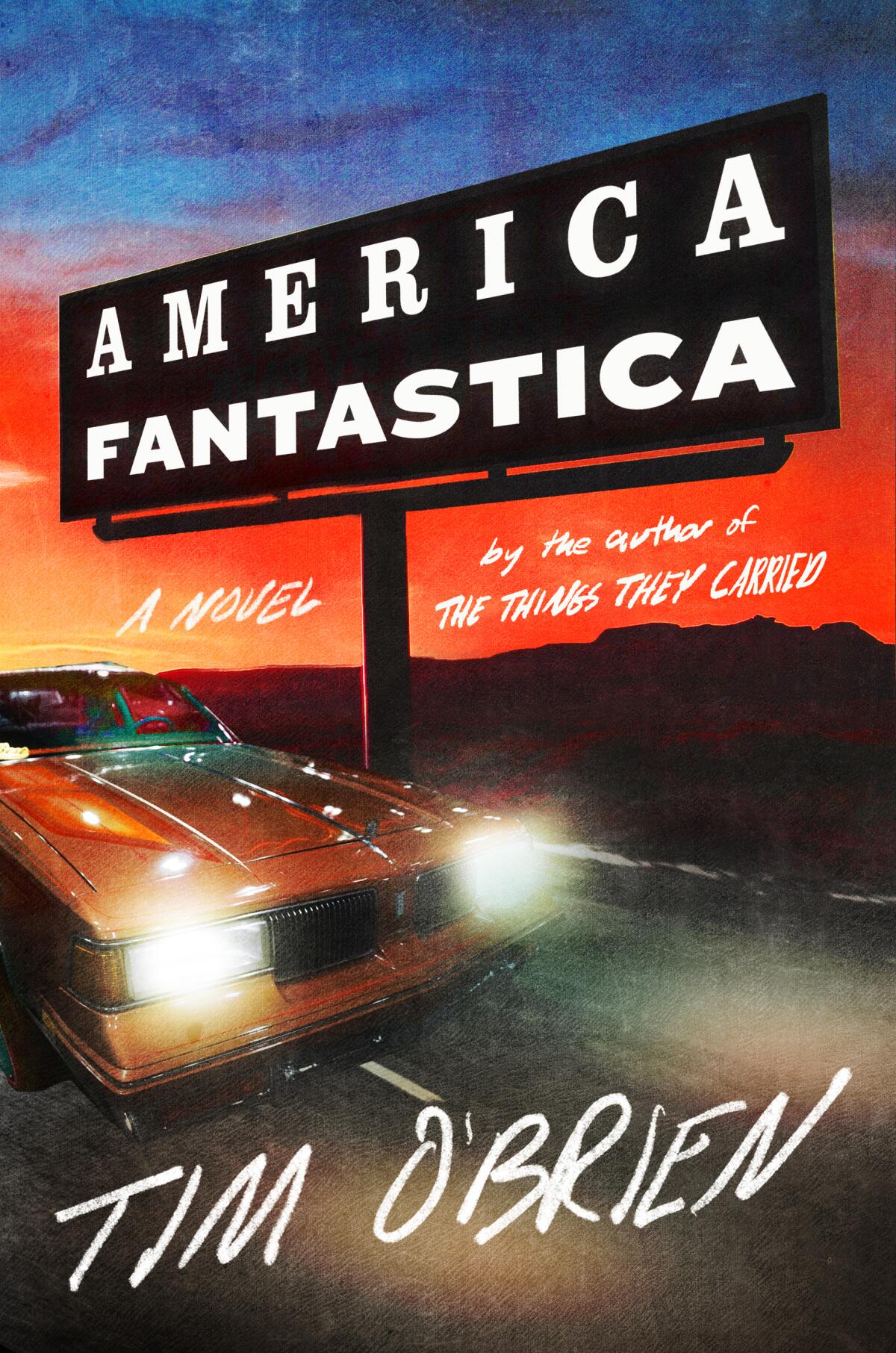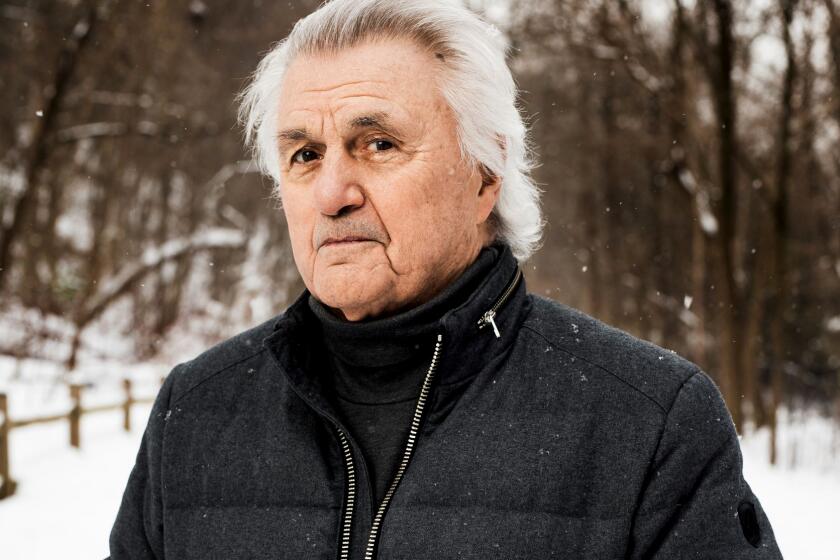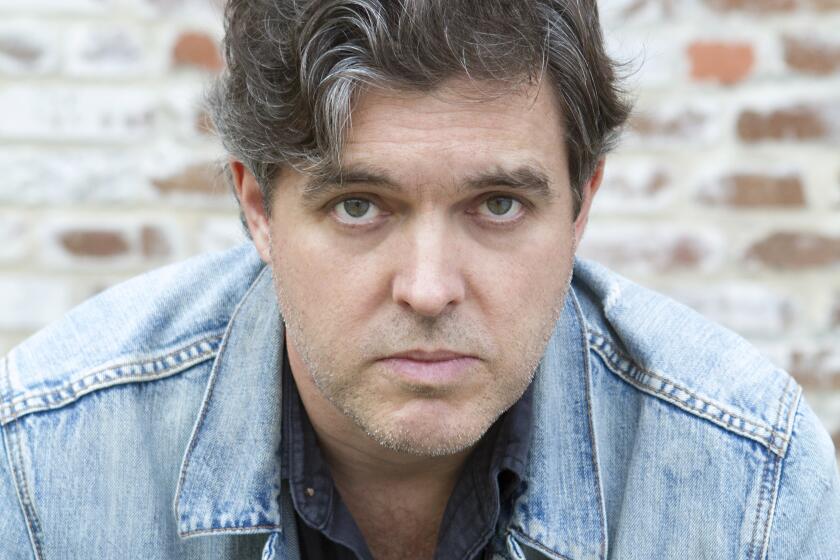Why Tim O’Brien’s first novel in 20 years is about America’s ‘mythomania’

- Share via
On the Shelf
America Fantastica
By Tim O’Brien
Mariner: 462 pages, $32
If you buy books linked on our site, The Times may earn a commission from Bookshop.org, whose fees support independent bookstores.
“Mythomania — or plain old lying — infiltrated churches, schools, hair salons, corporate boardrooms, courtrooms, and nightclubs.” So Tim O’Brien describes the state of things in “America Fantastica,” the renowned author’s first novel in more than two decades. A tongue-in-cheek exploration of a Trumpified COVID-era United States, the rollicking farce is populated by a sprawling cast of characters including Boyd Halverson, a compulsive liar turned bank robber; Angie Bing, a Pentecostal bank teller and bigamist; Randy Zapf, a hapless criminal with delusions of serial-killer grandeur, and other desperate eccentrics. As the Swiftian narrative meanders across the Western U.S., its dubious protagonist Boyd is forced to confront his own complicity.
O’Brien is a longtime commentator on American society, most notably via his acclaimed 1990 novel “The Things They Carried,” which took an experiential look at the realities of the Vietnam War in which he served. Today that particular title is part of the American literary canon gracing course syllabi across the nation, while his other works have been recognized with a range of prestigious awards and honors. Closing in on 80, O’Brien admits “America Fantasica” is very likely his last.
To mark its release, O’Brien spoke to The Times via Zoom from his home in Austin, Texas. Our conversation, which spanned the inspiration for “America Fantastica,” his legacy as a writer and interrogations into the importance of truth, has been edited for length and clarity.
At 80, the author of “The World According to Garp” and so much more talks about his longest and Irving-est book yet, “The Last Chairlift.”
Where did the idea for your first novel in 20 years come from?
It began with characters, really. It began with Angie Bing 20-some years ago. I had started writing about her — maybe 10, 20 pages or so — and I didn’t really have a story. I had the opening but then it didn’t seem to go anywhere, so I dropped it. And for all that time she was just nagging at me. That memory of those pages. I liked the sound of her voice and I liked how nuts she was and yet how determined she was. Just irrepressible. And then COVID came along, and election stuff came along, and conspiracy stuff, and I had a story.

But you came back to this before COVID. When exactly?
About five years ago. At first I was just f— around, thinking, what can I do with Angie after 20 years? And the more she spoke, the more I wanted to know about her. I didn’t plan anything. I’ve never done a book where I thought I knew the ending. I don’t think I would write it if I knew the ending, or if I even knew what the next chapter would be about. When you get deeply into writing a novel, things occur almost as if by magic. It’s like a firecracker. There’s an endorphin rush that goes with it.
You use the word “mythomania” several times in the book. What a great word. Where did the idea for an epidemic of lying come from?
The conspiracy stuff … I live in Texas — it’s all around me. It’s not just on CNN or Fox. It’s people that you meet that really believe this stuff. It doesn’t matter that it’s preposterous, ludicrous, impossible and certainly false. I got tired of yapping to myself about it. Rationality is just out the window. You can’t convince people that they’re nuts, so I thought it’s better to laugh at them. I guess laughter is one way of striking back, its own form of revenge.
A lot of the characters in the book are absolutely terrible people, but at the same time you often end up feeling bad for them because they’ve gotten so caught up in all of it.
Probably the dominant theme of the book is that quote from [William Butler] Yeats — “we had fed the heart on fantasies, the heart’s grown brutal from the fare.” And it’s not just political. On-the-road fantasies — all these things will be better if I can just get out and take that trip to Yellowstone, then you get to Yellowstone and the lines are a mile long and there’s nowhere to camp and there are bugs and grizzly bears and you’re fighting with your wife. Casino fantasies. Religion fantasies. I’ll-live-through-my-children fantasies. There’s just so many of them. Gunslinger fantasies — I go after that in the book. Charles Manson fantasies. Randy wants to be Charles Manson. That’s his dream. You can get brutal in your heart if you’re living your life in a kind of fantasy world.
Kevin Powers was among the best in a wave of novelists on Iraq and Afghanistan. His new thriller, “A Line in the Sand,” signals their slow fade from relevance.
You write at some point, “Why should truth matter?” Does it?
Great question, especially when you’re asking a fiction writer. I’ve been writing about it for years starting with my first book. Almost no matter what comes out of your mouth you can find something to suggest that it may not be true. It’s now noon in Austin, but it’s not noon where you are and it’s not noon in Tokyo. It’s a complicated issue and especially complicated for a fiction writer where you’re trying to tell a lie. You’re almost using lies to try to get at universal kinds of truths. It matters when it begins to hurt other people. Or if it causes hurt to a democracy.
Politics have been woven into your work throughout your career, but “America Fantastica” is arguably your most overtly political novel. Are you a particularly politically-minded person?
I’m interested in politics insofar as it touches people. My opinions about the Vietnam War are pretty obvious, but they’re not politically stated. They’re done in terms of what happens to those soldiers who are fighting and dying and being wounded and are confused and don’t know what the war is for and why they’re there. It’s the impact of political decisions on people that interests me.
You’ve been writing for 50 years, including one novel that’s now part of the American canon. How do you feel about your legacy as a writer?
I think I’m probably done. I will be 77 in two weeks. I’ve got bad carpal tunnel [syndrome] — really, really, really bad. Typing is just a chore. I’ve got to peck it out with one finger. God, writing a novel that way — it’s hard to imagine doing that. I can’t 100% say I’m not going to write another book, but the odds are really, really slim.
Veteran puts aside Vietnam for a tale about boomers who had to settle for less
Looking back, are there any titles in particular that you’d hang your hat on?
“America Fantastica” is one of them. Another is “The Things They Carried.’ “[Going After] Cacciato.” “In the Lake of the Woods.” All four of them go after the same thing, this truth/falsehood issue, and blur between the two, which is how the world has approached me for so many years. I remember in Vietnam thinking, Am I really here? Is this real? It was so antithetical to anything I’d ever done. I hated camping out. I hated guns. I knew nothing about anything military. It felt like I was in a book. I fantasized my way through Vietnam. That’s basically how I survived. Living in my head. Those four books in different ways touch on this blur between the real world and the world of imagination, which is partly the world of lies.
Hilden writes about art, science, politics and travel for a variety of publications.
More to Read
Sign up for our Book Club newsletter
Get the latest news, events and more from the Los Angeles Times Book Club, and help us get L.A. reading and talking.
You may occasionally receive promotional content from the Los Angeles Times.









